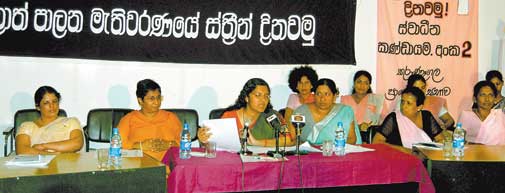| Plus |
|
|||
|
The
roar of rural women At local government level, too, the figures are not much better. In 1997, women’s representation stood at 3.5% in Municipal Councils, 2.6% in Urban Councils and a mere 1.7% in Pradeshiya Sabhas. Higher women’s representation, many people believe, will help change the prevailing political culture in the country and also see a stronger focus on issues that women are more concerned about at community level. Against this backdrop, it is heartening to note that an all-woman independent group has entered the fray to contest the upcoming local government elections. Last Tuesday, the group comprising 28 candidates, came to Colombo to outline their vision and display their strong determination to create a new political culture. This independent group is contesting the Kurunegala Pradeshiya Sabha. Some members of the group come from rural areas such as Bamunugedara, Mahiella, Boyagane, Ranawana, Malpitiya, Doratiyawa, Thorayaya, Wilbawa, Keliyagoda and Alakoladeniya but almost all of them are active members of various social groups such as death donation and women’s welfare societies within the Kurunegala Pradeshiya Sabha area. L.P.
Malani, leader of the independent group, is from Boyagane, Rathgalle. Since her husband, a soldier in the Sri Lanka Army, was killed in action in Weli Oya in 1991, her biggest challenge has been raising their three children. Malani has worked with many war widows and in 2003 was the head of the Kurunegala District’s Ranaviru Seva Authority. Having organized many workshops on women’s and children’s rights, Malani has wide knowledge and experience in communicating with village women. “In Kurunegala, 80% of the women actively participate in community workshops, but when it comes to decision making, men play the lead role. Men are usually unable to understand women’s issues and problems,” she says commenting on why there should be more women Pradeshiya Sabha members. “In some areas pregnant women walk more than four miles to reach a clinic or several miles to reach a well. Situations like these arise because there are no women in the decision-making process at Pradeshiya Sabha level,” she says adding that women have a good sense of managing funds. “A woman knows to make the maximum use of money. A village woman has the ability to earn a hundred rupees, manage it so well that she can do things worth a thousand rupees.” Explaining their campaign, Malani says this is their first step in politics and they are conducting the campaign without violence or resorting to any illegal practices. The group’s deputy leader Soma Hettiarachchi says people in the Kurunegala Pradeshiya Sabha area are curious about our plans, “because we are quite different from other political parties and independent groups”. “Even
if we fail this time we’ll never lose hope. We will continue
to train young women and make our group a force to be reckoned with,”
she says. Omar Fatima Dilsha from Keliyagonna is the only Muslim in this all-woman independent group. She says she must set a good example to all young Muslim rural women who tend to be more homely and seldom participate in social activities. “If
our groups can get at least one vote from one family unit, it will
be a huge achievement for us,” Dilsha says adding that her
entry into politics is not aimed at uplifting Muslim women alone
but all rural women in general. The Women and Media Collective has been supporting the group in its bid to enter politics. The WMC members say they strongly believe that women’s representation in political institutions and the decision-making process is vital for the development of the community because women have a solid understanding about the needs at community level. |
||||
Copyright © 2001 Wijeya Newspapers
Ltd. All rights reserved. |
